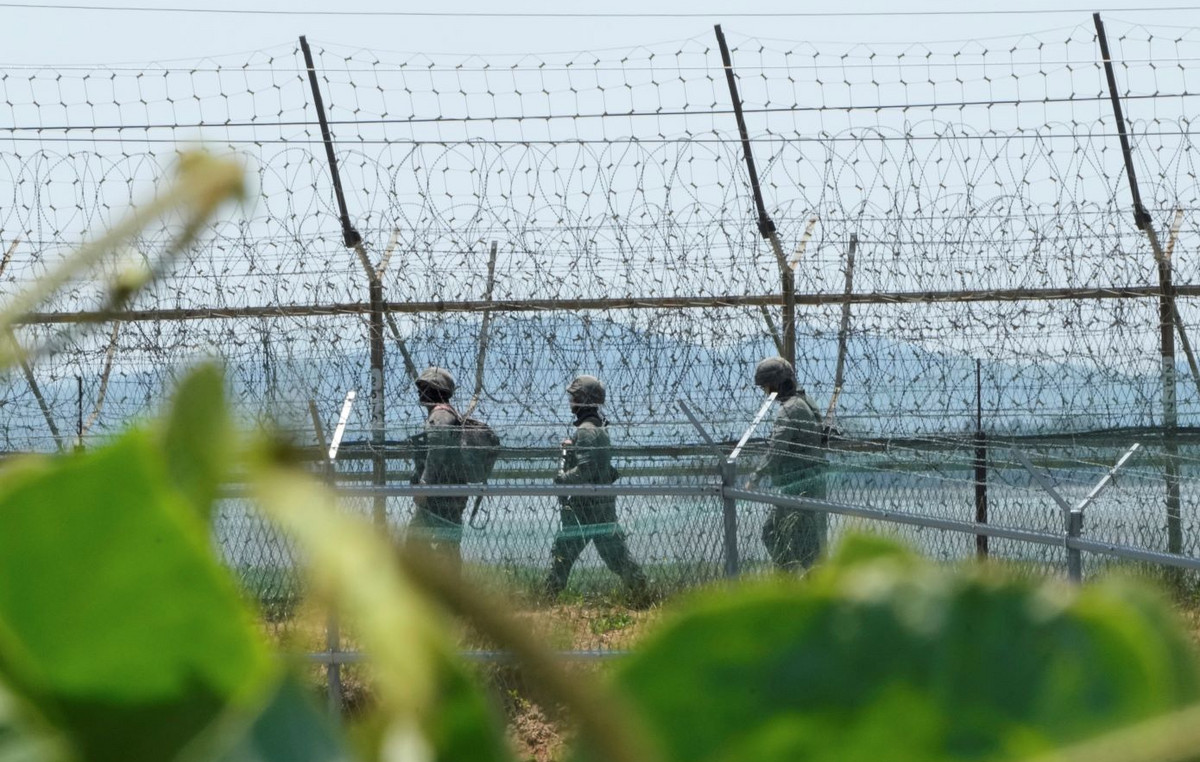Parwana Malik, a 9-year-old girl with dark eyes and rosy cheeks, laughs with her friends as they play jump rope in a dusty clearing.
But Parwana’s laughter fades when she returns home, a small hut with earth walls. There, she remembers her fate: the girl is being sold to a stranger as a bride.
The man who wants to buy Parwana says he is 55 years old, but for her he is “an old man” with white eyebrows and a thick white beard, as the girl told CNN on October 22nd. She fears he will beat her and make her work at his house.
But your parents say they don’t have a choice.
For four years, his family lived in an Afghan refugee camp in Badghis province in the northwest of the country, surviving on humanitarian aid and manual labor, earning a few dollars a day. But life has only gotten harder since the Taliban took power in Afghanistan on Aug. 15.
As international aid dries up and the country’s economy collapses, the family can no longer afford basic necessities such as food. Her father months ago sold his 12-year-old sister.
Parwana is one of many Afghan girls sold to get married after the humanitarian crisis deepened. The famine led some families to make painful decisions, especially as the fierce winter approached.
the parents gave the CNN full access and permission to talk to children and show their faces because they say they can’t change the practice on their own.
“Day by day, the number of families selling their children increases,” reported Mohammad Naiem Nazem, a human rights activist in Badghis. “There is a lack of food, there is a lack of work and families feel they have to do this”.
an impossible choice
Abdul Malik, Parwana’s father, cannot sleep at night. Just before closing the sale, he told the CNN who is “destroyed” by guilt, shame and worry.
He tried to avoid selling it — Malik traveled to the provincial capital, Qala-e-Naw, to look for work, also borrowed “a lot of money” from relatives, and his wife began begging for food from other camp residents.
But he felt he had no choice if he wanted to feed his family.
“We are a family of eight people,” he said. “I have to sell to keep other family members alive.”
The money from Parwana’s sale will only support the family for a few months before Malik finds another solution.
Parwana said he hoped to change his parents’ minds. Her dream was to become a teacher and therefore she didn’t want to give up her education. But the appeals were useless.
On October 24, Qorban, the buyer, arrived at the girl’s house and delivered the equivalent of US$ 2,200 (about R$ 12,400) in the form of sheep, land and money to Parwana’s father.
“This is your bride. Please take care of her. Please don’t hit her”, Abdul Malik, Parwana’s father
Qorban did not describe the sale as a marriage, saying he already had a wife and would look after Parwana as if she were one of his own children.
“Parwana was cheap and her father was very poor and needs money,” Qorban said. “She’s going to work at my house. I will not hit her. I will treat you like a family member. I will be kind.”
Dressed in a black veil over her head with a garland of colorful flowers around her neck, Parwana hid her face and whimpered as her weeping father told Qorban, “This is your bride. Please take care of her. You are responsible for her now, please don’t hit her.”
Qorban nodded, then grabbed Parwana’s arm and led her out the door. As they left, with her father looking at the door, Parwana dug her feet into the earth and tried to resist, but she couldn’t. She was dragged to the waiting car, and slowly walked away.
“Catastrophic”
Since the Taliban took power, stories like Parwana’s have been on the rise.
Although marrying children under the age of 15 is illegal across the country, it has been common practice for years, especially in the more rural parts of Afghanistan. Since August, cases have only increased, driven by widespread hunger and despair.
More than half the population faces acute food insecurity, according to a United Nations (UN) report released this week. And more than 3 million children under the age of 5 will face acute malnutrition in the coming months. At the same time, food prices are soaring, banks are running out of money and workers are out of pay.
Nearly 677,000 people were displaced in 2021 due to the fighting, according to the UN Office for the Coordination of Humanitarian Affairs (Unocha). Many live in tents and huts located in camps for internally displaced persons, like Parwana’s family.
“It’s absolutely catastrophic,” said Heather Barr, associate director of the women’s rights division at Human Rights Watch. “We don’t have months or weeks to contain this emergency: we are already in the emergency”. The problem is particularly acute for Afghan girls who have stayed at home and watched their siblings go back to school since the Taliban’s rise to power. The Taliban said it was working on a plan to allow the girls to return as well, but did not say when that might happen or what conditions would be imposed. Uncertainty and growing poverty have pushed many girls into the marriage market.
Once a girl leaves school, she is much more likely to get married. While she is at school, her family is investing in her future.
Heather Barr, Human Rights Watch
Once a girl is sold as a bride, her chances of continuing her education or pursuing an independent path are almost zero.
Instead, the girl faces a much darker future. Without access to contraceptives or reproductive health services, nearly 10 percent of Afghan girls aged 15 to 19 give birth each year, according to the UN Population Fund (UNFPA).
Many are too young to consent to sexual intercourse and face complications in childbirth due to their undeveloped bodies. Pregnancy-related death rates for girls aged 15 to 19 are more than double the rate for women aged 20 to 24, according to UNFPA.
“I don’t want to leave my parents”
Magul, a 10-year-old girl from the neighboring province of Ghor, cries every day as she prepares to be sold to a 70-year-old man to pay off her family’s debts. His parents borrowed about US$ 2,200 (R$ 12,400) from a neighbor in a village. But without a job or savings, they can’t pay off the debt.
The buyer took Magul’s father, Ibrahim, to a Taliban prison and threatened to imprison him for failing to pay the debt. Ibrahim said he promised the buyer he would pay within a month. But now the deadline is up.
“I do not know what else to do. Even if I don’t deliver my daughters, he will take them.”
Magul’s mother, Gul Afroz, feels equally powerless. “I’m praying to God that these bad days will pass,” the mother lamented.
Like Qorban, the buyer claimed that she would not mistreat Magul and that she would simply help cook and clean her house. But the assurances ring hollow in the face of his threats against Magul’s family.
“I don’t want to go with him. If they make me, I’m going to kill myself”, said Magul, between sobs, sitting on the floor of her house. “I don’t want to leave my parents.”
It’s a similar situation for a nine-member family in Ghor province that is selling two 4 and 9 year old daughters. The father has no job, like most in the displaced camp. But he faces even greater difficulties as a person with a disability.
If we have food and there is someone to help us, we would never do that
Rokshana, avó
He is prepared to sell the girls for around US$ 1,100 (or R$ 6,200) each. Zaiton, the 4-year-old girl with thin bangs and big brown eyes, said she knows why this is happening: “Because we are a poor family and we don’t have enough to eat.”
Drought in international aid
Local Taliban leaders in Badghis say they plan to distribute food to prevent families from selling their daughters. “Once we implement this plan, if they continue to sell their daughters, we will put them in prison,” said Mawlawai Jalaludin, a spokesman for the Taliban Department of Justice, without giving further details.
But the problem goes beyond Badghis. As winter approaches, both the Taliban and humanitarian groups are begging for more help, hoping that this could stem the rise in child marriages.
The Taliban’s rapid takeover of Afghanistan with the withdrawal of the United States and its allies led the international community to withhold financial assistance, money that had been vital in sustaining the country’s economy and its main services.
Countries and multilateral institutions are reluctant to renew pledges for fear of appearing to legitimize the Taliban as the leader of Afghanistan.
With the country’s economy close to collapse, UN donors pledged more than $1 billion (about R$5.6 billion) in humanitarian aid in September, of which $606 million (about R$3.4 billion) billions) would meet the most urgent needs of Afghans. But less than half of the pledged funds have been received, as some member states have yet to pay, according to an Unocha spokesperson.
Several of the families and experts expressed frustration with the shortage of help during the country’s most dire time.
Isabelle Moussard Carlsen, head of the Unocha office, emphasized that aid workers are still in the country, providing relief and supporting hospitals, but that is not enough.
“By not releasing the funds they’re holding from the Taliban government, it’s the vulnerable, it’s the poor, it’s these girls who are suffering,” Carlsen accused.
Barr and Carlsen recognized the need for world leaders to hold the Taliban accountable for human rights violations. However, they warned that the longer Afghanistan is without development aid or liquidity, the more families face starvation and more girls are sold.
The Taliban also asked for help. “The Taliban is asking aid agencies to go back to Afghanistan and help these people,” said a Taliban director of an IDP camp in Ghor province. I am asking the international community and aid agencies to come and help us before winter comes.”
I will have to sell another daughter if my financial situation doesn’t improve, probably 2 years old
Abdul Malik, pai de Parwana
Back in the homeless camp in Badghis province, Malik has no illusions about what the sale means for his daughter, or what the bleak situation means for his family’s future.
Qorban has said he will use his daughter as a worker, not a bride, but Malik knows he has no control over what happens to her now.
“The old man told me: ‘I’m paying for the girl. It’s none of your business what I’m doing to her. That’s my problem,’” Malik told CNN.
The ominous warning is even worse as he considers the bleak days ahead. The cold is approaching and snow has already started to cover parts of the country. When the money from Parwana’s sale runs out, he’ll be back to square one, with three daughters and a son still at home to support.
Reference: CNN Brasil
I’m James Harper, a highly experienced and accomplished news writer for World Stock Market. I have been writing in the Politics section of the website for over five years, providing readers with up-to-date and insightful information about current events in politics. My work is widely read and respected by many industry professionals as well as laymen.







